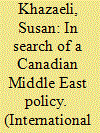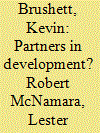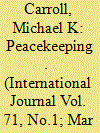| Srl | Item |
| 1 |
ID:
192886


|
|
|
|
|
| Summary/Abstract |
Public debate about Canada's role in the Middle East is divided between two camps. One camp contends that Canadian foreign policy should return to its Pearsonian roots, in which Canada plays the role of a dispassionate but honest broker. The other holds that Canada's foreign policy should be defined by high-minded principles. The disagreement is over norms, not interests. This paper refers to two former Prime Ministers who roughly embody the two schools of thought on Canada's foreign and defense policy in the Middle East: Lester B. Pearson and Stephen Harper. Contrary to conventional wisdom that Harper was a realist and Pearson, a Pearsonian, the paper demonstrates that Pearson pursued a realist foreign policy that advances Canada's national security interests whereas Harper was guided by a values-based neo-conservative ideology.
|
|
|
|
|
|
|
|
|
|
|
|
|
|
|
|
| 2 |
ID:
178197


|
|
|
|
|
| Summary/Abstract |
This article takes up the concept of mental maps as lens through which to survey Canada–Asia relations. Before Canadians could embrace Asia politically and economically, they had to stop imagining Asia as culturally distant. Their mental maps—the way they imagined the world—formed the invisible background to policy-making. Through an engagement with Greg Donaghy’s work on Canadian relations with Asia, this article makes the case for using mental maps to understand trans-Pacific relations.
|
|
|
|
|
|
|
|
|
|
|
|
|
|
|
|
| 3 |
ID:
137375


|
|
|
|
|
| Summary/Abstract |
In 1968, the newly appointed World Bank president, Robert McNamara, asked former Canadian Prime Minister Lester B. Pearson to chair a Bank Commission on International Development in hopes that he could revive the North’s flagging commitment to foreign aid promised under the banner of the Decade of Development. The Commission and its Report—Partners in Development—have a general reputation as farsighted approaches to problems of official development assistance. In Canada, the Pearson Commission is viewed through the lens of Canada’s commitment to Middle Power multilateralism. This analysis tests both interpretations by examining the Commission and the conception and reception of its work. Whilst the Middle Power concept circumscribed Pearson’s role and effectiveness, the Commission succeeded in helping Canada’s chief ally, the United States, share the burden of development assistance with its European allies. As in the realm of peacekeeping, Pearsonian development diplomacy was as much about shoring up relations with Northern allies as it was with developing new Southern friendships.
|
|
|
|
|
|
|
|
|
|
|
|
|
|
|
|
| 4 |
ID:
143525


|
|
|
|
|
| Summary/Abstract |
For Canadians there has been a great mystique surrounding peacekeeping. The idea that Canada is—or perhaps more appropriately was—a peacekeeping nation par excellence resonates deeply. Yet, however good this myth has made Canadians feel about themselves and their international contributions, it has ultimately done a disservice, leading to unrealistic expectations about what Canada and the blue berets could accomplish on the world stage. Furthermore, Canada’s involvement in United Nations peacekeeping operations has not been motivated solely by altruism, but rather has been based on eminently practical factors of national self-interest. There is much that the Canadian Armed Forces has to offer the world in terms of future peace and security operations, but it remains to be seen whether peacekeeping factors into this equation.
|
|
|
|
|
|
|
|
|
|
|
|
|
|
|
|